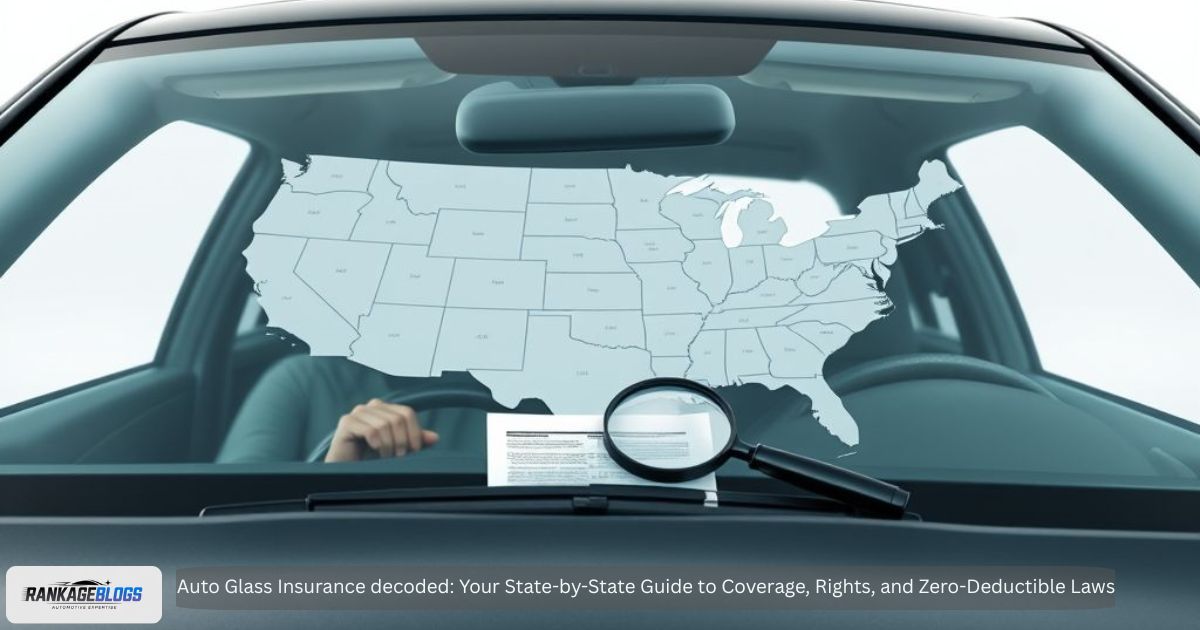Introduction: Why Your Windshield is a Critical Safety Device
State auto glass laws, combined with Auto Glass Insurance, establish the legal requirements for vehicle window visibility and safety across the United States. These regulations are not uniform and vary significantly by state, primarily governing the permissible levels of window tinting and mandating repairs for significant windshield damage that obstructs a driver’s view.
The primary safety standards are designed to ensure clear visibility for drivers, thereby reducing accidents and enhancing road safety for all. Understanding your local statutes is crucial, as non-compliance can result in fines or failed vehicle inspections. Drivers must be aware of their specific state’s compliance guidelines to avoid penalties and maintain safe driving conditions.
The Role of Auto Glass in Structural Integrity and Passenger Safety
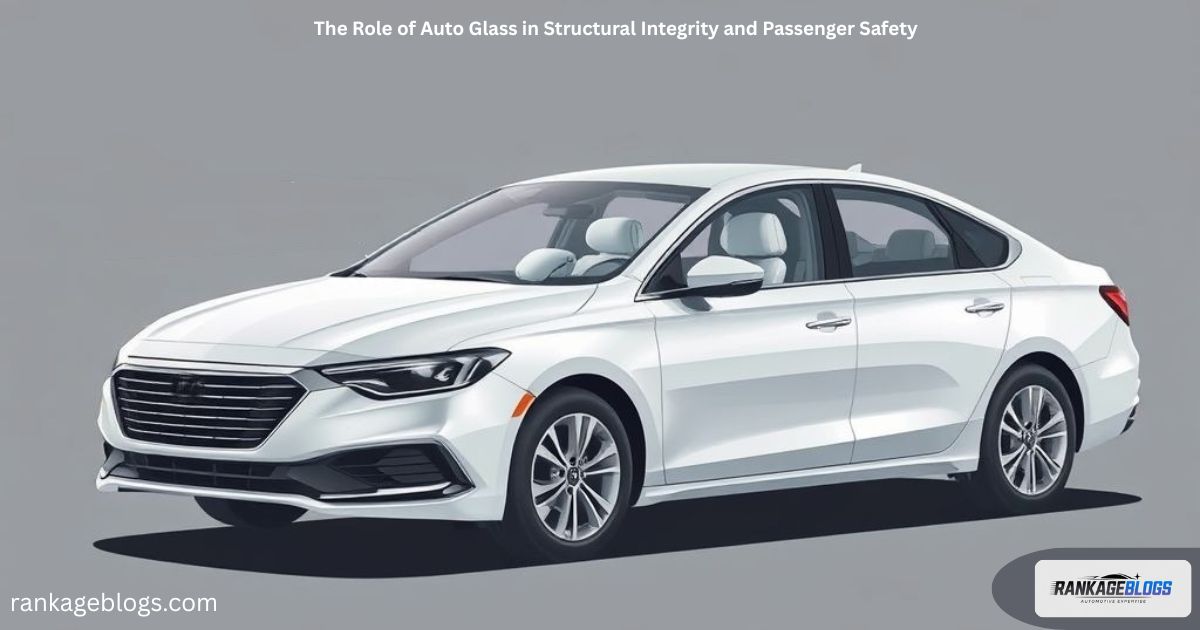
Your car’s windshield is a key component of its structural integrity, and Auto Glass Insurance ensures you can restore this safety feature affordably when damage occurs. In a frontal collision, it contributes up to 45% of the cabin’s crush resistance. In a rollover, it prevents the roof from collapsing catastrophically. Furthermore, the windshield is engineered as a backstop for the passenger-side airbag (Supplemental Restraint System – SRS). Upon deployment, the airbag inflates against the glass, which must be properly bonded to the frame to absorb the force and protect the occupant. A compromised or incorrectly installed windshield can fail under this pressure, leading to ejection or injury, turning a minor accident into a fatal one.
How Laws, Insurance, and Safety Intersect
State auto glass laws create a legal framework that mandates what is acceptable and what is not. These regulations define the maximum allowable crack size for a vehicle to pass inspection and be deemed roadworthy. Auto Glass Insurance policies are specifically designed to help you comply with these laws by covering the cost of repair or replacement. The entire system is built upon a foundation of safety. Legislators and insurers recognize that a clear, structurally sound windshield is not a luxury but a necessity for preventing accidents and protecting lives, which is why specific state-specific insurance policies often include favorable terms for glass coverage.
Auto Glass Insurance Decoded: Coverage, Clauses, and Costs
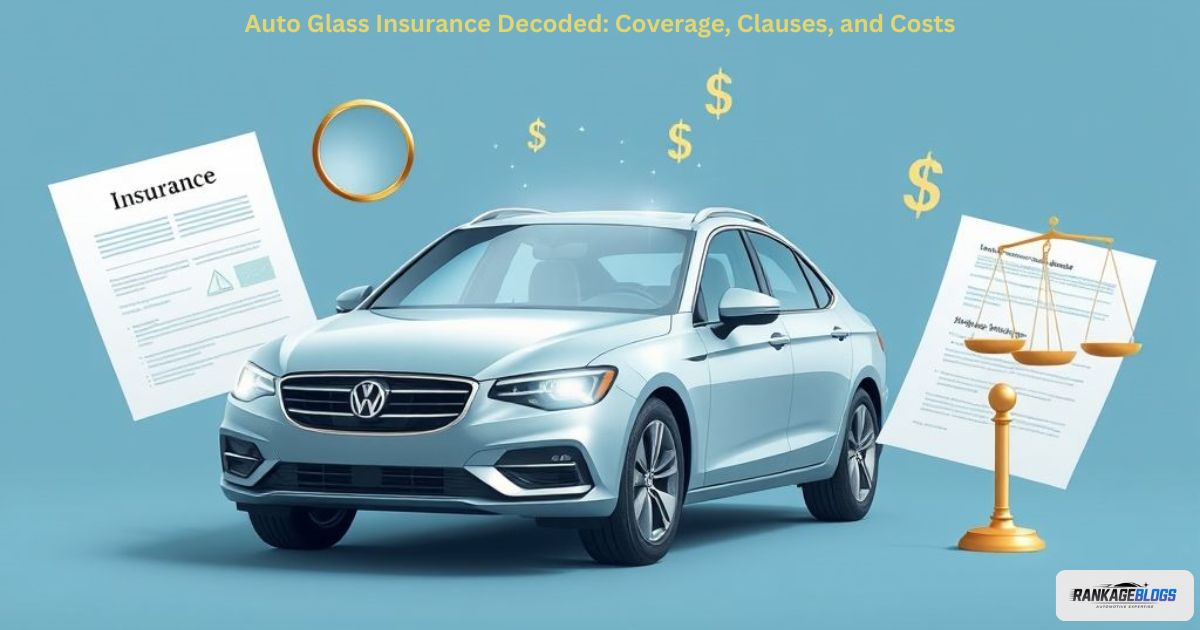
Navigating auto glass insurance can feel complex, but it boils down to understanding your policy’s specific clauses. Your coverage is the contract that dictates what is paid for and what you must pay. The core of this is knowing the difference between your main policy types and the various deductibles that apply. This knowledge is your first line of defense against unexpected out-of-pocket expenses and ensures you can restore your vehicle’s safety without financial stress.
The Fundamental Difference: Comprehensive vs. Liability Coverage
This is the most critical distinction. Liability insurance is mandatory in most states but only covers damage you cause to another person’s vehicle or property. It does not cover your own car’s repairs. Comprehensive coverage is an optional add-on that protects your vehicle from non-collision incidents. Since windshield damage typically results from road debris, vandalism, or falling objects—not a collision with another car—it is almost always covered under your comprehensive policy. If you only carry liability, you will likely pay for any glass work yourself.
What is “Full Glass Coverage” or “Zero-Deductible Glass”?
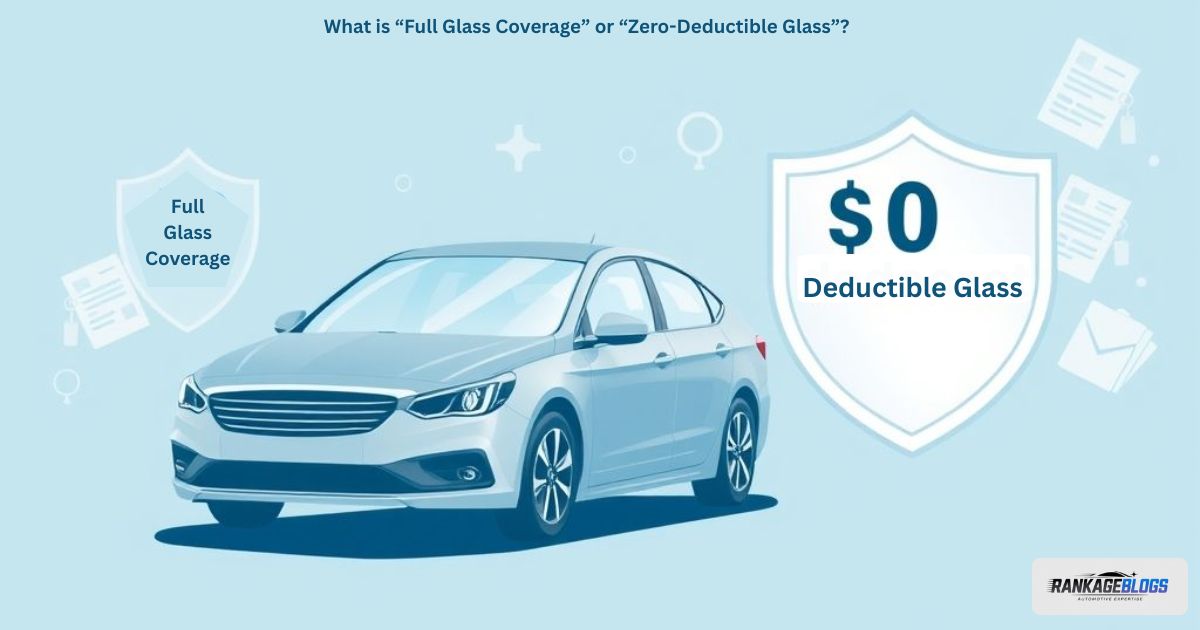
Some insurers offer an endorsement known as “full glass coverage” or “zero-deductible glass.” This is an addition to your comprehensive policy that specifically waives your deductible for glass-related claims. This means if you have a $500 comprehensive deductible but add this glass endorsement, you would pay $0 for a windshield replacement. It usually comes for a small additional premium, making it a cost-effective option for those concerned about frequent glass damage.
Understanding Deductibles: Standard, Glass-Specific, and Zero-Dollar
A deductible is the amount you agree to pay out-of-pocket before your insurance kicks in.
- Standard Deductible:Your normal comprehensive deductible (e.g., $500) applies to glass claims unless specified otherwise.
- Glass-Specific Deductible:Some policies list a separate, lower deductible (e.g., $100) specifically for glass damage.
- Zero-Dollar Deductible:Thanks to state laws or a specific endorsement, you pay nothing. The insurance company covers the entire cost.
When Is Windshield Replacement Not Covered by Insurance?
There are scenarios where a claim may be denied. If the damage is deemed pre-existing before your policy started, it won’t be covered. Damage from a collision where you are at-fault would fall under your collision coverage, not comprehensive. Intentional damage or damage resulting from illegal activity is also excluded. Furthermore, if you only have liability insurance, your own glass damage is not covered.
If the glass breakage occurred during an “at-fault” accident (e.g., you collided with a pole), the damage falls under your collision coverage, not comprehensive, and your collision deductible will apply.
Will My Insurance Company Pay If I Only Have Liability Coverage?
No. If you only carry liability coverage, your insurance provider will not pay for your windshield replacement or any other repairs to your own vehicle. Liability insurance is strictly designed to cover damages you are legally liable for causing to others. You would be responsible for the full out-of-pocket cost of any auto glass service.
How to Negotiate the Best Glass Coverage with Your Insurer
When shopping for or renewing your policy, be proactive. Ask specifically about glass deductible waivers or full glass coverage endorsements. Inquire about the cost to add it versus the potential savings on a replacement. Mention that you are comparing quotes and that favorable glass terms could win your business. Knowing your state’s laws also gives you leverage; you can ask if their policies are aligned with local consumer protection statutes.
What to Do When Your Insurance Denies Your Claim
First, don’t panic. Request a formal explanation for the denial in writing. Carefully review your policy’s declarations page to verify the coverage you believed you had. If you think the denial is in error, you can appeal the decision with your insurer’s internal review board. If that fails, you can file a formal complaint with your state’s Department of Insurance through the NAIC Consumer Portal. They will investigate whether the insurance carrier is violating any state laws or acting in bsad faith.
File a claim appeal with a formal letter that includes your claim number, a clear statement that you are appealing the denial, a reference to the specific state law in your favor (e.g., Florida Statute § 627.7288), and any supporting photos. If the internal appeal fails, you can file a formal complaint with your state’s Department of Insurance using their online portal. Your complaint should detail the denial, your appeal attempts, and why you believe the insurance carrier is violating state laws.
The Definitive State-by-State Breakdown of Auto Glass Laws
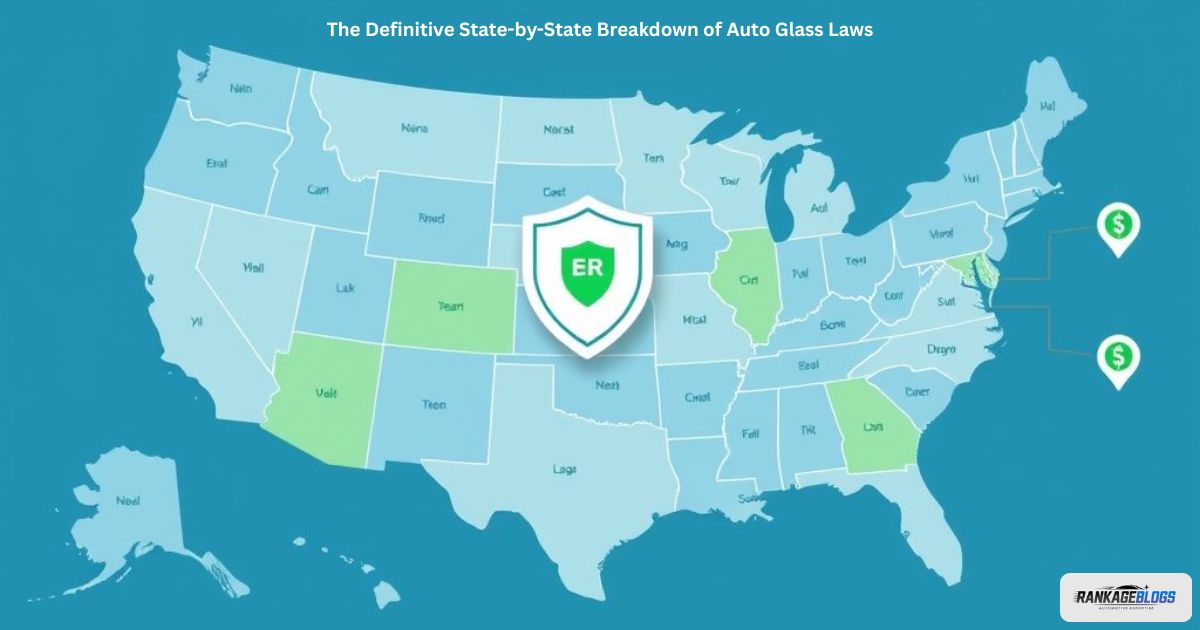
The United States lacks a single federal law governing auto glass replacement, creating a complex patchwork of state-by-state auto glass insurance laws. These regulations primarily dictate the relationship between insurance companies and policyholders, often mandating that insurers waive deductibles for glass work. These zero deductible auto glass laws are designed to encourage drivers to fix damage immediately, thereby upholding vehicle safety standards. Your rights and costs are directly determined by your zip code.
What “Zero-Deductible” Really Means: A Legal Explanation
Legally, “zero-deductible” means that your auto glass insurance provider cannot require you to pay your standard comprehensive deductible for a windshield repair or replacement claim. If you have comprehensive coverage, the law forces the insurer to treat glass claims differently than other types of claims. The insurer must fully cover the cost of the auto glass service without any financial contribution from you, aside from your premium. This removes the financial barrier that might cause a driver to delay a critical safety repair.
Comprehensive List of Zero-Deductible States
Several states have enacted strong consumer protection laws. It is crucial to check for the most current information, as laws can change.
Kentucky: The Model for Consumer-Friendly Laws
Kentucky’s law (KRS 304.39-110) is one of the strongest. It requires insurers to waive any deductible for the repair or replacement of all safety glass components if the policyholder has comprehensive coverage. This makes windshield replacement truly free for insured drivers, reinforcing the state’s commitment to road safety.
South Carolina, Arizona, Florida, Connecticut, New York, Massachusetts: Key Provisions and Nuances
- Florida:Statute § 627.7288 prohibits insurers from applying a deductible to windshield replacement if you have comprehensive coverage.
- South Carolina:Code of Laws § 38-77-140 mandates that no deductible is applied to windshield replacement, and insurers cannot cancel your policy for filing a claim.
- Arizona:The law is more nuanced. Insurers must offer full glass coverage, but policyholders can reject it in writing. If you accept it, you get zero deductible glass repair.
- Connecticut:Statutes § 38a-334 and § 38a-353 prohibit deductibles for repair and replacement of glass within the state’s borders.
- New York:Regulation 64 mandates that insurers cannot impose a deductible for glass repair if it can be safely repaired. For replacement, your standard deductible may apply unless you have a specific waiver.
- Massachusetts:Law M.G.L. c. 175, § 113B states that glass coverage is mandatory on all policies, and a deductible can only be applied if the driver is 100% at-fault in an accident, which is rare for glass claims.
States with Partial Coverage or Specific Conditions
Some states, like Minnesota, have laws that require insurers to offer zero-deductible glass coverage, but policyholders must specifically add it to their policy for an extra fee. Others may have laws that only apply to repairs (not replacements) or have specific conditions based on the type of damage or the insured’s claim history.
Legal Crack Size and Damage Limits by State
Most states have laws prohibiting driving with a cracked windshield that obstructs the driver’s view. Specific size limits vary widely. For example:
- California:Cracks cannot exceed 1/2 inch inside the driver’s line of sight.
- New York:Damage cannot be within the area cleaned by the wipers.
- Texas:No specific measurement, but a crack that impairs vision is illegal.
Always check your local DMV regulations, as a ticket for impaired vision is common.
States with OEM Glass Replacement Requirements
Most states allow insurers to use aftermarket parts (non-OEM) for replacements. However, some states, like Florida, have laws requiring insurers to pay for OEM parts if the vehicle is new (often defined as less than 2-3 years old) unless the consumer agrees to aftermarket. Always know your right to request OEM glass, though you may have to pay a price difference.
However, always scrutinize your policy’s fine print. Some insurance policies contain an “aftermarket parts agreement” clause, where you, as the policyholder, may have agreed in advance to the use of non-OEM parts in exchange for a lower premium. This can complicate your right to demand OEM glass. During renewal, you can often negotiate the removal of this clause.
Understanding “Choice of Shop” Laws: The Utah Model and Beyond
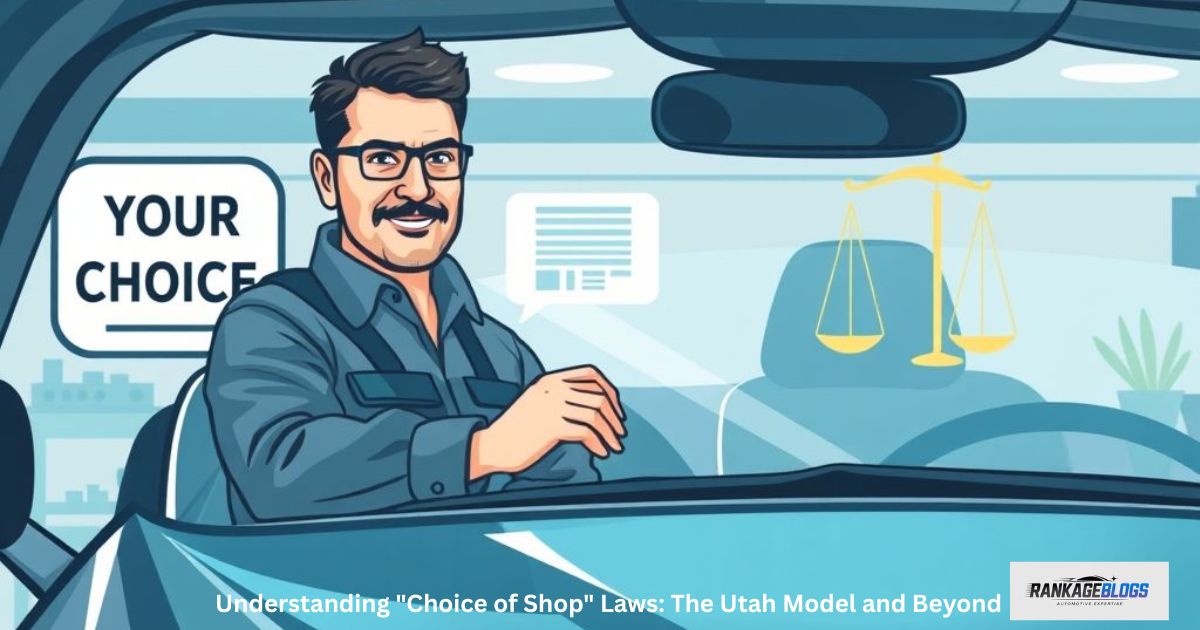
Many states have “choice of shop” laws that prevent insurance steering. This means your insurer can recommend a network shop, but they cannot require you to use it. You have the legal right to choose any properly licensed and certified auto glass installer you prefer.
How These Laws Protect You from Insurance Steering
Insurance steering occurs when an adjuster pressures you to use their “preferred” shop, often because they have a contract for lower rates. These shops may use lower-quality glass or techniques to meet the insurer’s price point. Choice of shop laws empower you to select a technician you trust, ensuring the job meets high safety standards like AGRSS (Automotive Glass Replacement Safety Standard), not just an insurer’s budget.
State Safety Inspection Laws: Regulations on Cracks, Chips, and Tint
States with mandatory vehicle safety inspections will often fail a car for a cracked windshield that extends into the driver’s sightline. The rules are strict because visibility is paramount. Additionally, aftermarket window tint on the windshield (except for the top AS-1 line) is illegal in most states and will also cause a vehicle to fail inspection.
Special Windshield Laws for Commercial Vehicles
Commercial vehicles are subject to much stricter Federal Motor Carrier Safety Administration (FMCSA) regulations. They cannot have any crack or discoloration that obstructs the driver’s view. The rules are zero-tolerance because these large vehicles pose a greater safety hazard on the road.
Penalties for Non-Compliance and Driving with Damaged Glass
Driving with illegally impaired visibility can result in a traffic ticket, fines, and points on your license. If your vehicle fails inspection due to glass, you will not receive a valid inspection sticker, which can lead to further fines. In the event of an accident, a damaged windshield could be cited as a contributing factor, potentially affecting liability.
Quick-Reference Master Chart: Your State’s Glass Coverage Law at a Glance
| State | Zero-Deductible Law? | Key Provision | OEM for New Cars? |
| Florida | Yes | Full replacement covered | Yes |
| Kentucky | Yes | All safety glass covered | No |
| South Carolina | Yes | Insurer cannot cancel policy | No |
| Arizona | Yes (if not rejected) | Must offer in policy | No |
| Massachusetts | Yes (de facto) | Mandatory glass coverage | No |
| New York | For repair only | Deductive may apply for replacement | No |
| Texas | No | Standard deductible applies | No |
| California | No | Standard deductible applies | No |
Note: This is a simplified overview. Always verify with your state’s DOI.
How to Check the Latest Updates for Your State
Since state auto glass laws can change, the most reliable source for current information is your state’s Department of Insurance website. They regulate insurers and provide consumer guides. Your local Department of Motor Vehicles (DMV) can also provide information on safety inspection standards and visibility laws.
The Premium Dilemma: Will a Windshield Claim Raise My Rates?
This is one of the most common fears. The good news is that in most states, a comprehensive auto glass insurance claim for glass damage is considered a “no-fault” event and is unlikely to cause your premium to increase. Insurers view it similarly to a claim for hail damage or a stolen windshield—it’s an incident largely outside your control. However, the frequency of claims or your specific insurer’s policies can influence this, making it crucial to understand the distinction between an inquiry and a formal claim.
“Claim” vs. “Inquiry”: Why Checking Coverage Shouldn’t Cost You
You can and should call your insurer to ask about your coverage without officially filing a claim. This is an inquiry. Simply asking, “What is my glass deductible?” or “Am I covered for a rock chip?” should not be logged as a claim that affects your premium. Only when you provide your information and ask to proceed with a repair does it become a formal claim. Always clarify with the representative that you are just gathering information.
“Act of Nature” vs. “At-Fault Accident”: How Insurers Classify Glass Damage
Glass damage is almost always classified as an “act of nature” or “vandalism” under your comprehensive coverage. This means it was not caused by a collision with another vehicle where you were at fault. Since you are not considered responsible for the event, it is statistically less likely to trigger a rate increase compared to an “at-fault accident” claim under your collision coverage.
State Laws That Forbid Premium Increases for Glass-Only Claims
Many states with strong zero deductible laws, like Florida and Kentucky, also have regulations that expressly prohibit insurance companies from raising your rates solely for filing a glass claim. This consumer protection is built into the law to ensure people fix damage without fear of financial penalty.
Will a Windshield Claim Raise My Rates? State-Specific Rules
While general trends exist, the final answer is state-specific. In zero-deductible states, it is illegal for a claim to affect your premium. In other states, while uncommon, it is not explicitly illegal. An insurer might increase your premium if you file multiple comprehensive claims in a short period, as it suggests a higher risk. The only way to know for sure is to ask your insurer about their specific policy regarding glass claims.
The Insurance Premium Impact Formula: How Claims are Logged
Insurers use complex algorithms to calculate risk. A single, isolated glass claim is a minor factor. However, if you have a history of several claims (glass or otherwise), you may be deemed a higher-risk policyholder, which could lead to a premium increase at renewal. It’s not the glass claim itself but the pattern of claims that triggers action.
Legal Framework, Safety Standards, and Compliance
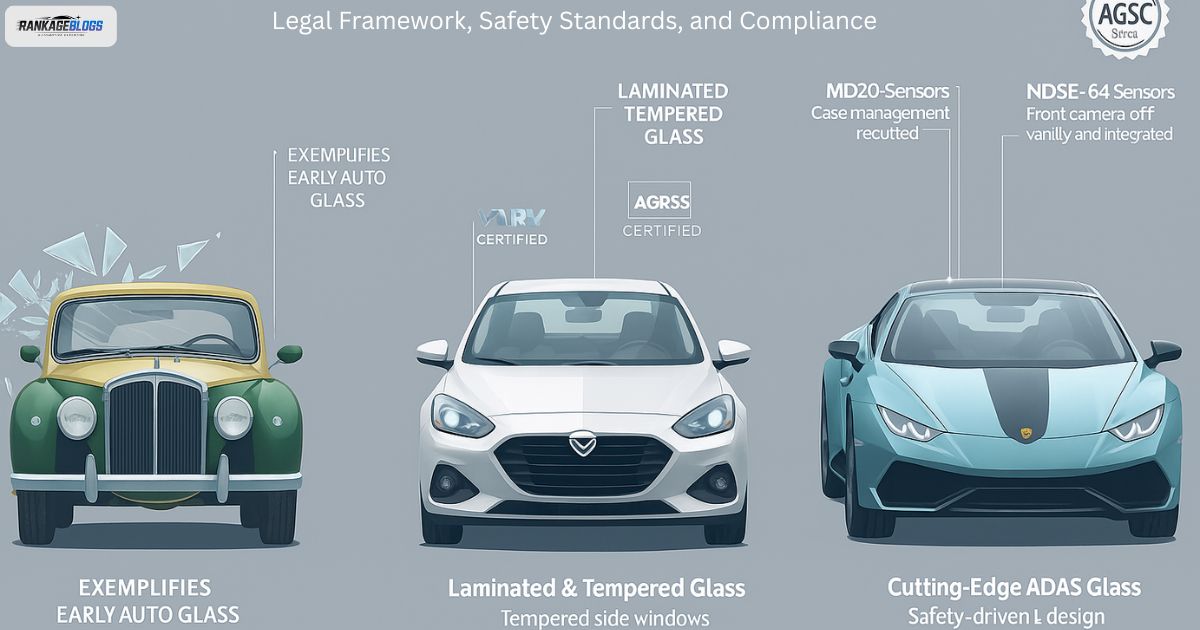
The importance of auto glass safety has evolved dramatically. Early cars used plain glass that shattered into dangerous shards. The invention of tempered glass for side windows and laminated glass (a plastic layer sandwiched between two layers of glass) for windshields was a major leap forward, preventing ejection and providing crucial structural integrity. Today’s ADAS-integrated safety glass continues this legacy, which is why modern standards like the AGRSS are so critical.
Beyond auto glass insurance and state laws, a robust framework of safety standards and technical regulations governs the auto glass industry. These standards, developed by organizations like the Auto Glass Safety Council (AGSC), define the correct procedures for installation to ensure the vehicle’s occupant safety systems function as designed. Compliance with these standards is not always required by law, but it is the definitive benchmark for a quality, safe repair that protects you and your passengers.
The AGRSS Standard: The Gold Standard for Safe Auto Glass Installation
The Auto Glass Replacement Safety Standard (AGRSS) is the North American industry standard for safe windshield replacement. It provides detailed guidelines on every aspect of the process, from adhesive selection and application to proper priming and curing times. A shop that is AGRSS compliant commits to following these rigorous protocols, giving you confidence that the installation will restore your vehicle’s original structural integrity and safety.
Federal Motor Vehicle Safety Standards (FMVSS) for Auto Glass
The FMVSS are federal regulations that all vehicles must meet to be sold in the U.S. FMVSS 205 specifically governs automotive glass, requiring it to be made of safety glass (laminated for the windshield, tempered for side and rear windows). It also sets standards for optical clarity and breakage patterns. These standards ensure the glass itself is safe before it even gets installed in a vehicle.
OEM (Original Equipment) vs. Aftermarket Glass: What’s Legally Permitted?
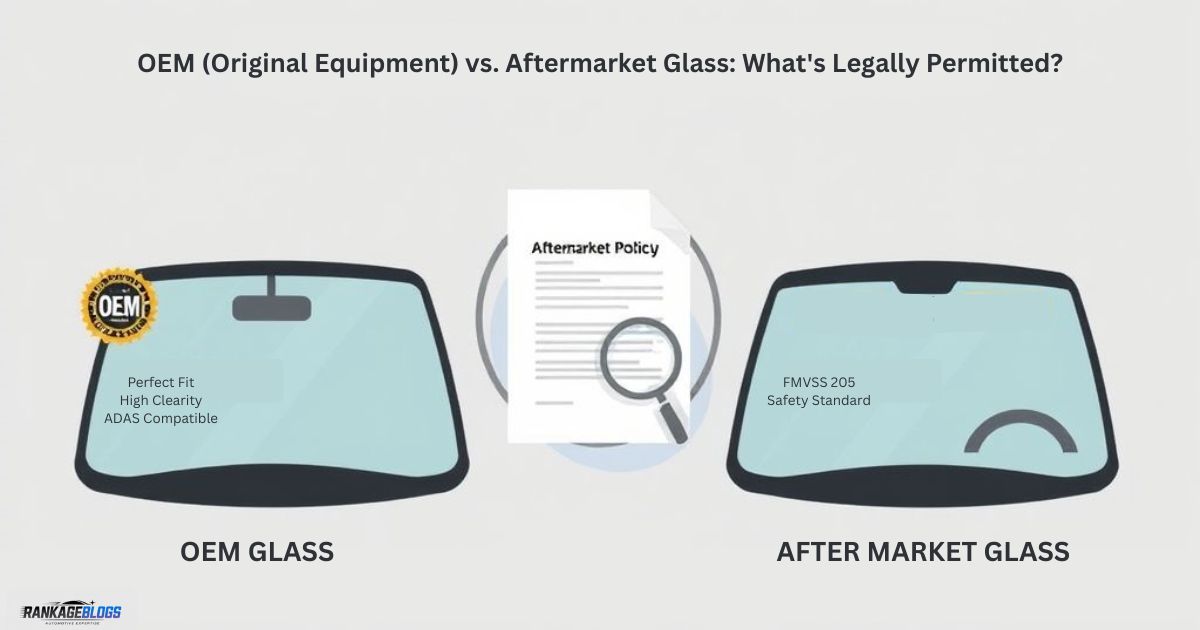
In most states, it is perfectly legal for insurers to use aftermarket glass as a more affordable alternative to OEM parts. Aftermarket glass must meet or exceed FMVSS 205 safety standards. However, there can be differences in fit, clarity, and the integration of features like sensors. For newer vehicles, some states require insurers to pay for OEM glass, but the consumer can opt for aftermarket to avoid a price difference.
However, always scrutinize your policy’s fine print. Some insurance policies contain an “aftermarket parts agreement” clause, where you, as the policyholder, may have agreed in advance to the use of non-OEM parts in exchange for a lower premium. This can complicate your right to demand OEM glass. During renewal, you can often negotiate the removal of this clause.
Penalties for Non-Compliant Glass and Ignoring Damage
The primary penalty for driving with non-compliant or damaged glass is a traffic citation for impaired visibility. Furthermore, if an improperly installed windshield fails in an accident—causing ejection or airbag failure—the installer and potentially the vehicle owner could face significant civil liability in a lawsuit. Using non-compliant glass voids warranties and can lead to leaks, wind noise, and sensor malfunctions.
Certification and Licensing Requirements for Auto Glass Technicians
Licensing requirements vary by state. However, the most important credential to look for is certification from the Auto Glass Safety Council (AGSC). AGSC certification proves the technician has undergone training and passed tests on safe installation practices, including the AGRSS Standard. Always choose a certified technician to ensure the job is done right.
Your Rights as a Consumer: Protections and Recourse
As a auto glass insurance policyholder and consumer, you have specific rights designed to protect you from unfair practices by insurance companies or shoddy work by installers. These rights include choosing your repair facility, receiving quality parts and service, and having a clear path for recourse if something goes wrong. Being aware of these rights is your strongest tool for ensuring a fair outcome and maintaining your vehicle’s safety.
Your Legal Right to Choose the Repair Facility
This is your most important right. In most states, insurance companies cannot force you to use their “preferred” or “network” shop. They can recommend one, but the final choice is yours. You have the right to select any licensed and qualified auto glass company you trust. This is often enshrined in state laws to prevent insurance steering.
How to Identify and Resist Insurance Steering Tactics
Steering happens when an insurance adjuster pressures or incentivizes you to use their network shop. Red flags include:
- “We can’t guarantee the work if you don’t use our shop.” (This is often false).
- “It will be faster if you use our shop.” (Your chosen shop can often work just as quickly).
- “You’ll have to pay more out-of-pocket if you choose your own shop.” (This is illegal if the shop’s rates are reasonable).
Politely but firmly insist on your right to choose. You can say, “I understand, but I have selected my own installer.” Once you have chosen your installer, you can prepare for the next steps by reviewing our guide on what to expect during the windshield repair and replacement process.
Understanding Warranty Coverage on Parts and Labor
A reputable installer will offer a warranty on both the glass itself and their labor. A standard warranty is often lifetime against leaks and defects for as long as you own the vehicle. Always get the warranty details in writing before work begins. This protects you if a problem arises later.
What to Do If You Receive Subpar, Unsafe, or Non-Compliant Service
- Address it immediately:Contact the shop’s manager and explain the issue.
- Document everything:Take photos and notes of the problems.
- Invoke your warranty:Demand they fix the issue under the terms of the warranty.
- Escalate:If the shop is unresponsive, contact your insurance company (as they paid for the work) and file a complaint with your state’s Department of Insurance and the Better Business Bureau (BBB).
How to File a Formal Complaint Against a Shop or Insurer
If you cannot resolve the issue directly, you can file a formal complaint with your state’s regulatory bodies:
- For complaints against an insurance company, file with your state’s Department of Insurance.
- For complaints against an installer, file with your state’s licensing board (often the Department of Consumer Affairs or Attorney General’s office). These agencies can investigate and mediate disputes.
The Role of Your State’s Department of Insurance
Your state’s Department of Insurance (DOI) is the government agency that regulates all insurance companies operating within the state. Their role is to protect consumers. They ensure insurers follow state laws, investigate complaints of bad faith, and provide resources to help you understand your policy and rights. They are your most powerful ally in an insurance dispute.
What to Look for When Buying a Used Car
If you are buying a used car, a poorly replaced windshield is a major hidden safety hazard. Inspect the glass for the manufacturer’s marking (often in a corner) to see if it matches the vehicle’s original brand. Check for uneven gaps between the glass and frame, visible urethane adhesive, or any signs of leaking. Most importantly, test all Advanced Driver Assistance Systems (ADAS) like lane departure warning to ensure they function correctly, as a bad installation often requires recalibration.
Frequently Asked Questions (FAQs)
Does GA replace windshields for free?
No, Georgia has no zero-deductible law; you’ll pay your comprehensive deductible unless you have a specific glass waiver.
Does Texas replace windshields for free?
No, Texas lacks a zero-deductible law, so you are responsible for paying your comprehensive deductible.
What are the rules for windshield replacement in Florida?
Florida law mandates true $0 deductible replacements if you have comprehensive coverage and guarantees your right to choose your installer.
What is the windshield replacement law in Arizona?
Arizona requires insurers to offer zero-deductible glass coverage, which you must accept to get free repair or replacement.
Can you get a windshield replaced for free in Florida?
Yes, with comprehensive coverage, Florida law requires insurers to fully cover the cost with no deductible.
How much is the deductible for a windshield?
It varies from $0 (with a waiver or in certain states) to your standard comprehensive deductible amount (e.g., $500).
Do insurance companies waive deductibles for windshield repairs?
Yes, many insurers waive the deductible for repairs to avoid the higher cost of a full replacement.
Do I have to pay my deductible for a small rock chip repair?
Typically, no; most insurers encourage repairs by waiving the deductible for small chips.
Can my insurance company force me to use aftermarket glass?
In most states, they can specify it, but you usually have the right to request OEM glass, potentially by paying the price difference.
Is it illegal to drive with a cracked windshield?
Yes, it is illegal if the crack obstructs the driver’s view, a standard enforced by state safety inspections.
Conclusion: Being an Informed and Protected Driver
Navigating auto glass laws and insurance is about more than just fixing a crack—it’s about actively protecting your safety and your financial well-being. The journey from damage to resolution involves understanding your policy, knowing your state’s unique regulations, asserting your right to choose a quality installer, and ensuring critical steps like calibration are completed. By becoming an informed consumer, you transform a stressful event into a manageable process, ensuring your vehicle is returned to its safest possible condition.
Key Takeaways: Always Know Your Policy, Your State’s Laws, and Your Rights
- Know Your Policy: Understand the difference between comprehensive and liability coverage and check for a glass deductible waiver.
- Know Your State’s Laws: Determine if you live in a zero-deductible state like Florida or Kentucky, which changes the entire claims process.
- Know Your Rights: You have the right to choose your repair shop and to receive a safe, proper installation that includes necessary calibrations.
Additional Resources and References
For the most accurate and up-to-date information, always consult official state resources and industry standards organizations. These entities provide unbiased guidance that can help you verify the information from insurers and shops, ensuring you are always making decisions based on the latest regulations and best practices.
Essential Links to State DMV and Insurance Commissioner Websites
• National Association of Insurance Commissioners (NAIC) Directory: https://www.naic.org/state_web_map.htm (Provides direct links to each state’s Department of Insurance)
National Auto Glass Specifications (NAGS)
• Website: https://www.nags.com/ (Provides industry-standard pricing data and glass codes)
Auto Glass Safety Council (AGSC)
• Website: https://agsc.org/ (The premier organization overseeing the AGRSS standard for safe installation protocols)

